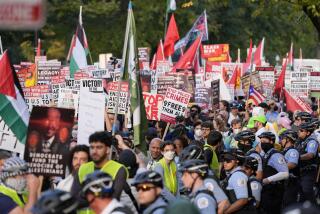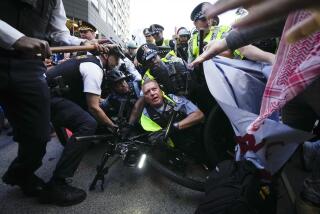Occupy Wall St. activists in N.Y. join May Day protest
NEW YORK -- In the birthplace of last yearâs nationwide Occupy movement, the campaign that had seemed to drop from sight after being evicted from its New York City encampment surged back into the public eye Tuesday with a series of May Day protests, the largest drawing thousands of people to Union Square in Lower Manhattan.
There were no immediate signs of clashes, but tensions were apparent as the afternoon wore on and police erected metal barricades around most of the sprawling square to hem in protesters. Local media reports said 30 people had been arrested, mostly for disorderly conduct.
About 5:30 p.m. EDT protesters began marching down Broadway, headed by a man carrying a large American flag hanging upside down. Crowds waving posters bearing pictures of Che Guevara and banners of labor unions taking part in the march moved slowly down Broadway, which police had closed to traffic at the height of rush hour.
âThe workers united will never be defeated,â chanted one group walking with a large banner that read: âSmash the 1 percent with communist revolution.â
Drums pounded, trumpets blared and whistles screamed as the crowd made its way toward downtown through the East Village neighborhood, past fast-food outlets, diners, clothing stores, banks and boutiques. Some waved at people peering down from windows of their apartments. One group was dressed as a baseball team, in blue caps and white uniforms with âTax Dodgersâ written on their uniforms in the same script as the real Dodgers. They even carried baseball bats.
Scores of police stood nearby but did not interfere in the march, which had a legal permit to make its way down to the headquarters of the Metropolitan Transit Authority about a mile and a half away.
On the face of it, the gathering looked and sounded like those that engulfed the city last fall, as Occupy Wall Street established itself as a social movement here and sparked similar encampments across the country. But Mark Bray, of the groupâs media relations section, said it was markedly different.
âWhatâs changed is that the original effort was to try to get awareness, to try to break through to people and get them talking about these issues,â Bray said. âAt this point, Occupy is a name people recognize. Now the challenge isnât so much getting attention as trying to focus on certain issues.â
He cited student loans and housing as among the issues that Occupy planned to address in future marches and rallies through the spring and summer.
Bray also said the groupâs fundraising tactics had changed, to try to get donors to contribute for specific causes -- such as helping the May Day rallies take place -- rather than looking for blanket donations to cover all of the movementâs needs. Those needs have diminished considerably since Nov. 15, when police dismantled the camp that was feeding thousands and housing hundreds of people daily.
âOur overhead is a lot lower,â Bray said.
One issue that remains unresolved is whether Occupy Wall Street should try to occupy a new space now that winter is over and the weather is more conducive to 24-hour drum circles and outdoor kitchens.
Whichever way the movement goes, supporters said the important thing was that it remained active. âItâs important to show the message is far from dead,â said Jumaane Williams, a New York city councilman and strong backer of the group, who was among the thousands in Union Square. âI think people are confusing the fact that itâs morphing and changing with it being dead.â
In fact, Bray said, throughout the winter Occupy held regular meetings to plan future protests and events.
âIf we hadnât been doing that, this wouldnât have materialized,â he said of the rally.
ALSO:
Ohio Boy Scout official resigns in support of ousted lesbian leader
5 arrested in alleged terrorist plot to blow up Cleveland-area bridge
âLunaticâ called inappropriate for federal law; use of term may be banned
More to Read
Sign up for Essential California
The most important California stories and recommendations in your inbox every morning.
You may occasionally receive promotional content from the Los Angeles Times.











